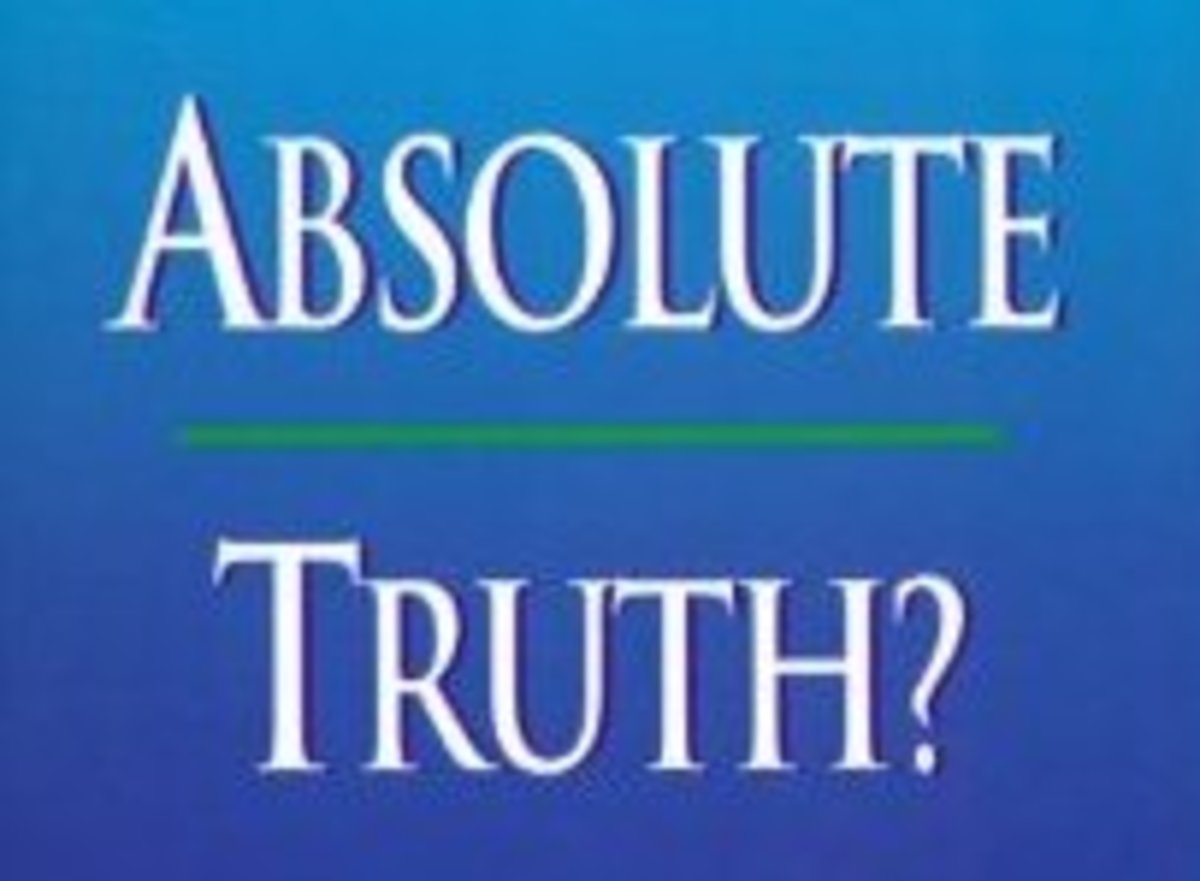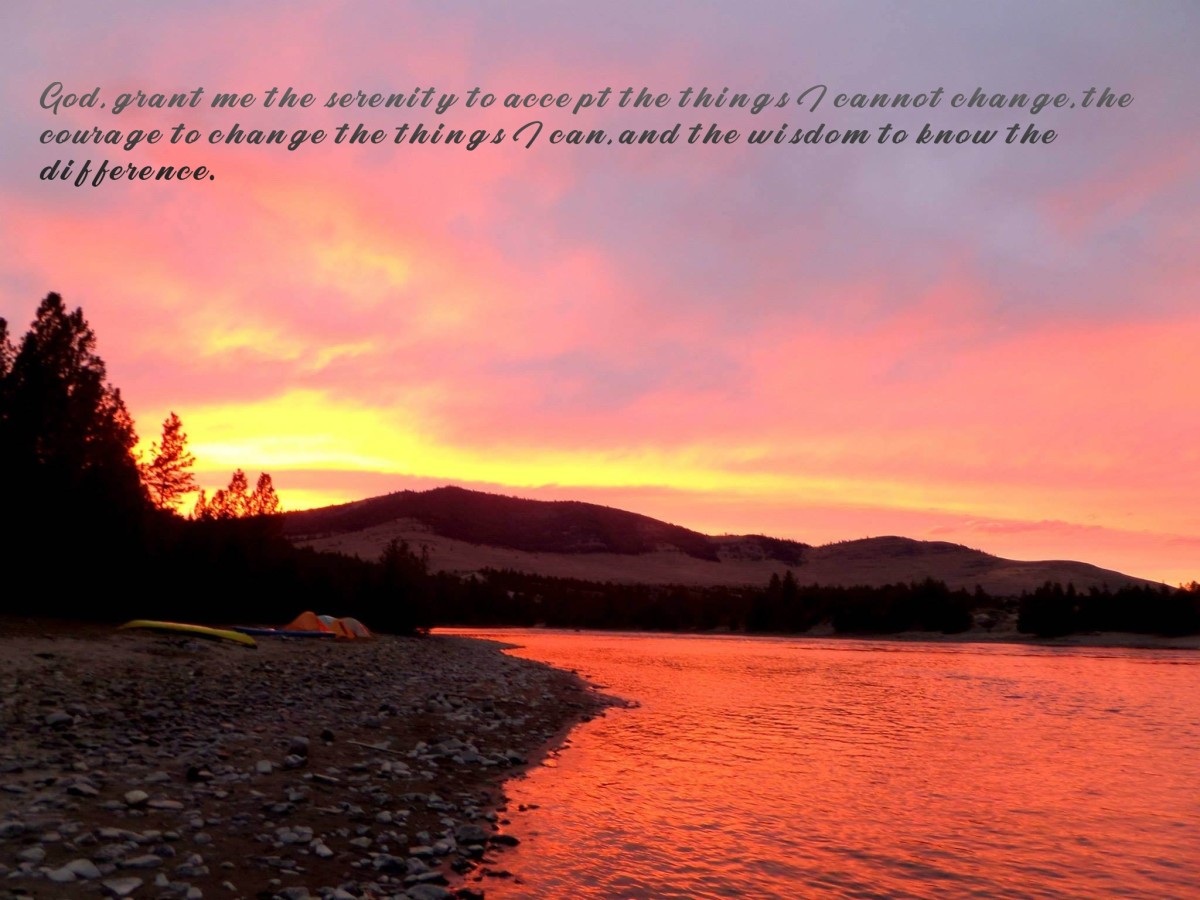The Problem with Familiar Truth and Religious Belief

Traditional Judaeo-Christian Religion Tends to Deal with Absolute Verses Relative Truth
In 2015 we attended a Presbyterian Retreat which looked at the growing trend toward relative truth verses absolute truth and how the new generation was trending toward relativism, where there are no absolutes. An example of absolute truth is that stealing is wrong no matter what the reason. Relative truth might say stealing is wrong unless you are being oppressed by those who have more and then it is okay to take what you need by force because the people withholding resources are in the wrong, not the ones who are stealing resources. Relativists are convinced that in this case, stealing is right because they are correcting a wrong that has been done to them. Absolutists say that stealing is always wrong and while it may seem to alleviate an immediate need, it will create a long-term problem. If we followed God’s laws and gave freely to those in need then there would be no need for anyone to steal. So the solution to the problem is not to usurp the will of God and follow our own idea of what is right, but to do right for the benefit of everyone.
What is Familiar Truth
A familiar truth is neither absolute nor relative but one that has been drilled into us until it becomes automatic – If you do not study, you will not pass the test. If you work hard you will get ahead in life. If you do not eat right and exercise you will be unhealthy.
These are all familiar truths with which most people agree upon.
An Example of a Familiar Truth Which Proved to Be Incorrect
Horse owners were once told to never let a hot horse drink cold water and never put cold water on a hot horse or it would cause the horse to collapse and go into a state of shock. Research has since shown this to be false, even though some horses did collapse when cold water was placed on them. The research showed that it was not the water, but the overwork and the horse would have collapsed whether the water was applied or not, yet thousands of horse owners still will not use cold water on a hot horse or allow the horse to drink until after it has cooled down. Another familiar truth is when people believe that cold wet weather can make you sick. It can’t. Rolling around in the snow may make you cold, but it will not give you a cold, yet thousands still believe it will and can give you hundreds of incidents where someone played in the snow and got a cold the next day, probably because they were already getting a cold before they played in the snow or they had a compromised immune system and were more vulnerable to bacterial and viral infections suspended in the air and on surfaces around them.
How a Familiar Truth is Different from Believing a Lie, Myth or Old-Wives-Tale
We live in a world of familiar truths. Most of these beliefs are harmless but they creep into every aspect of our lives and when it comes to serious issues like health, they can kill us. How often were you told something was good for you five years ago and found out it was bad for you now or that it did not hurt to participate in a certain practice that is now seen as having devastating results? Drinking, smoking, vaping, eating various foods, taking certain medications or herbal supplements have all seen their ups and downs on the scale of truth in the last few decades. We are not believing lies, we are going by solid evidence presented by knowledgeable people so how can they and we be wrong? Scientific research is not supposed to be biased. Drug and food manufacturers are supposed to run extensive tests on their products and there are government agencies designed to check and double-check food and drug safety so how is it that a food deemed as harmful is now safe or a drug deemed as a miracle cure is now causing multiple injuries and death? Are we believing in lies or believing in truth?
We are believing in what can be called, familiar truth and we are not really at fault for doing so. We are trusting professionals and going by our own and other people’s experiences but are we and they experiencing a placebo effect where you feel like something is working so therefore you believe it works?
How We Learn What is True from What is False
Most of us pride ourselves on knowing important information and sharing that information with others in part to show how smart we are but in part because we are excited to be able to contribute to someone else’s knowledge and hopefully share useful information that will make their lives better. It feels good to do something nice for someone, but sometimes we go from wanting to help others to wanting to control others and dictate what they believe is true according to our familiarity with the subject and this is where familiar truth can become dangerous, especially where religious belief is concerned.
Now if you are a relativist, you may believe that all religions are valid in their own way, but if you believe in absolute truth, you believe there is only one way and if you are not following this path, you are headed in the wrong direction. The problem is, there are a lot of variables being added to the mix and it is sometimes difficult to determine what is true and what is false. One way to start is by comparing information and looking at where it came from. Another way is to compare facts. Does one supposed fact claim that another supposed fact is not true? Then you must decide if both are not true or if one is false and one is true or if there is a little bit of truth to both, but a little bit of lies mixed in as well. The bottom line is that if they contradict one another they cannot both be true.
Determining Fact from Fiction Using the Bible as an Example
How can you determine if something is factual and not just a theory or a story handed down from generation to generation until it becomes so familiar that everyone believes it is true? The best way is to start with the source. For Christians that would be the Old Testament.
If you do a search for – proving the Bible is not a myth – you will come across hundreds of articles stating that it is and very few stating that it isn’t. When faced with the enormous opposition to the Bible being true, many believers may doubt the familiar truths they grew up hearing in church.
While many believe the Bible to be a collection of stories and myths, remember there are just as many more believing the Holocaust was a myth despite photographs and historical eye witness accounts. The further along we go from an actual historical event the less likely we are to believe the written account since we did not experience it ourselves and especially when special interest groups cast doubts on the event being recorded as it truthfully occurred. Think JFK conspiracy theories here or astronauts landing on the moon.
The Bible has undergone hundreds of years of scrutiny by scholars searching to prove or disprove the texts. Many communist countries ban the Bible because they fear it will inspire insurrections against corrupt governments. Would a mythical collection have that impact on modern-day humanity?
When the modern Bible is compared to ancient texts, it is surprisingly accurate. There are multiple eye-witness accounts written within 80 years of less of the life of Jesus on earth. Scholar James Crossley determined that the writings of Mark were written within ten years of Jesus’ death and the apostle Paul gave detailed information on the early Christian churches even addressing disbelief and ungodly practices creeping into the church soon after the death of their leader. It is unlikely a mythical book would point out the flaws of the burgeoning religion but would instead seek to make it more appealing to the masses.
Scholars note that both Old and New Testaments were written from an historical perspective as well as a story telling perspective, giving dates, names, locations and incidents and listing the rulers, climate conditions, astronomical occurrences, traditions and countries in conflict during these events.
Archaeological discoveries have also backed up historical sites mentioned in the Bible including the pool John speaks about in John 5:1-2 by the Sheep Gate in Bethesda which was not discovered until the 1930s and thought not to exist until that time disproving critics who claimed the information was false and while the discoveries do not prove the Bible to be true, they do support that the gospels did occur in the time and place they were said to occur which makes it harder to say they were made-up stories with no proof they were written at the time Jesus lived.
Still, to believers it is not the historical accuracy so much as the spiritual truths that draw us to believe that what we are reading is true. It is not always feel-good literature. It reaches into the very depth of your soul and gives you no excuse to behave as if you are mightier than a made-up god. Instead you become humbled at the absolute truth that if you lead the life Christ called you to lead then there would be no need of relative truths and while the truth can become familiar, we are told to question our familiarity and challenge ourselves to dig deeper.
1 John 1: 5-10 – Light and Darkness, Sin and Forgiveness – As Factual as It Gets
An atheist professor trying to tell his students the difference between philosophy and religion stated, “philosophy is about facts, religion is about feelings.” He went on to suggest that religion cannot be factual because it is based on faith. We’d beg to argue against that point-of-view and here is a good example from the 1 John 1, verses 5-10 –
5 This is the message we have heard from him and declare to you: God is light; in him there is no darkness at all. 6 If we claim to have fellowship with him and yet walk in the darkness, we lie and do not live out the truth. 7 But if we walk in the light, as he is in the light, we have fellowship with one another, and the blood of Jesus, his Son, purifies us from all sin. 8 If we claim to be without sin, we deceive ourselves and the truth is not in us. 9 If we confess our sins, he is faithful and just and will forgive us our sins and purify us from all unrighteousness. 10 If we claim we have not sinned, we make him out to be a liar and his word is not in us.
That’s the basic facts of Christianity. We believe in God. We believe God is good. We believe he sent his son to show us the terrible cost our sin has brought into the world. When we walk in light and do good, we live in harmony. When we choose to do evil we hurt others as well as ourselves. We cannot live in harmony with one another if we do not strive to be and do good.
That is not so much a statement of faith as it is acknowledgement of who we are as followers of Christ and what we strive to achieve. We don’t believe this without proof. We put it to the test. We run an experiment. We test our hypothesis – if we walk in the light and follow the will of God, we will create a better world for all who are in it.
The null hypothesis is that it does not matter how we act or what we believe or whether we follow God or our own inclination, the outcome will still be the same regardless of faith, belief or right doing. We have ample evidence from corrupt individuals, businesses, governments, even churches which prove that not following the will of God for our lives can lead to chaos, disease, death and destruction. We can claim to follow Christ but still walk in darkness and do evil things, but if we truly walk in the light, there is no room for darkness.
Why familiar truths can hurt both Christians and non-Christians
As Christians, we are called to love others above ourselves, to give to those in need, to return kindness for evil. Christ never calls us to harm anyone for any reason. We are instead called to lift-up others and while we are also called to rebuke evil and correct sinners in the faith, we are also told to be forgiving, fair and understanding.
Despite the raw truth of the gospel, many Christians have been corrupted by culture, government, greed, politics and a sense of ownership – thinking they deserve more for working harder, which ironically is addressed in the Bible along with sharing what you have with others so no one will be in need.
So why can’t certain Christians see why what they are claiming as Godly is often sinful? It is because they have been corrupted by familiar truth. Often these perceived truths come not from Christ but from man. Too many Christians, like so many non-believers have become so adapted to the ways of the world that they barely resemble the Christians Christ wants them to be. We have become a meme society. A meme is an element of our culture or way of belief that is passed from one individual to another much like genetics are passed from one family member to another.
If your friends or parents tell you that everyone on Welfare is draining the country dry or that Millennials have no manners or that Baby Boomers are responsible for creating wars and global warming, will you blindly believe and have faith that the information you are being given is true, or will you think for yourself and question this supposedly factual information and the implications it has on your faith?
Will you defend your hypothesis with lies, rumors, attacks on anyone disagreeing with you or will you gather facts and test the information in varying situations to confirm that your hypothesis appears to have merit? If the results do seem to confirm your hypothesis, can it be refined? Can you rule out certain elements that may taint the experiment. Can you perform a double-blind experiment to rule out bias or expectations?
If we test rich, white kids in affluent neighborhoods and schools and compare their school grades with poor immigrate students moving from farm to farm and having to work as well as study or inner-city low-income kids who live with gang violence would it be fair to say – white kids are smarter because they score higher or would your research be flawed?
College students ran a psychology test on random people and asked them to place names with faces and careers. They used names like Willy Brown, Bryson Worthington, Jose Martinez, Jung Lee, Mavis Gaskin and Ramona Baker and used unlikely to be recognized people’s photos from old newspapers and magazines and asked people from all walks of life to match the names with the faces and did the same thing without faces and asked them to match the names with their made-up careers.
In all cases the results were similar. The more ethnic sounding a name was, the more likely it was to be matched to its expected ethnic face. The wealthier sounding names were more likely to be associated with higher paying positions. Shaniqua was more likely listed as a secretary or store clerk while Charlotte was more likely to classified as a real estate investor or a party planner. Buffy was thought to be a rich blond while Tara was most often thought to have darker hair and middle income.
We have inbred expectations and like to fit things neatly into categories that make sense to us and so we put people in memes and define them with such conviction that we cannot imagine they can ever climb over the boundaries we have set for them.
Try telling people that you believe if Christian prayer cannot be taught in schools then Buddhist meditation should not be allowed to be taught either and watch the fur fly as Buddhism is called a philosophy that benefits youth while Christianity is deemed full of hatred and intolerance and forces beliefs on others upon pain of death. Is this factual or is it feelings?
Today we have the internet and social media to contend with, where people share their opinions like glitter on a holiday greeting card and like glitter those tidbits of information tend to stick in our minds until we come to see them as the real-deal or as familiar truths backed up by millions who claim it is truth and woe unto anyone who claims differently or tries to tell us we are wrong.
The familiar brings us together, but it can also drive us apart. It is not a bad idea to research things and learn new things before accusing someone of lying or purposefully trying to mislead others to gain control and appear to be more intelligent or powerful.
If you believe in God, don’t be under the assumption that anyone who does not believe as you do is evil and deserves punishment. If you don’t believe in God, don’t act like you are a god and know more than anyone because you read a rebuttal of faith on the internet and now feel like an expert on the subject. Above all, do not ridicule someone for their belief. Instead try to find out why they believe as they do and encourage respectful conversation. Don’t name-call and shut people off as if they have no right to share a different view from yours. No one learns from that kind of treatment and on the flip-side of things, you can’t win your argument if no one is willing to listen to you anymore.
In Conclusion
We have looked at three kinds of truth. Religion and law often expound upon the absolute. The law says if you drink and drive you go to jail. The Bible says if you kill another human you are guilty of murder. Relative truth is often associated with people who drift in the wind and have no strong moral boundaries. People are free to choose what they believe and what they do not. No outside force can dictate what is right and wrong for them. It is all relative. Familiar truths are truths we have come to accept as factual. They are not absolute truths and they are not relative though they may contain elements of both. We believe them to be true because we have seen and heard them repeated so often that they appear to be unquestionably correct, but upon closer examination we may discover that there are other factors involved that we did not perceive. Unless we investigate those factors we can not be certain that what we believe is true. Familiar truths are subject to change based on an increase in our knowledge base.
Familiar truths are not bad, but they can be misguided. Relative truths help soften the punitive nature of absolute truths but can lead to accepting lies as truths. Absolute truths can be so harsh that, even though they may be true, they inflict great pain and hardships on others who refuse to see them as truth.
Humans are pretty good at ferreting out the truth but all of us have succumbed to lies and even lie to ourselves trying to ease the guilt of something that makes us feel uncomfortable. Truth is often used as a weapon to attack rather than a tool to become better. Challenge yourself to look deeper into your own familiar truths and see where they came from and why you believe them. Are you following culturally accepted memes that mask themselves as witty facts when instead they are deceptive tools that fool you into feeling superior to others and invalidating their input?
Biblically, truths are called light and lies are called darkness. We are daily inundated by both. We daily blend truth and lies until they turn to shades of gray that are imperceptible to one another. We avoid those black areas and seek out the light, but at some point the light becomes so bright that it hurts our eyes and we find ourselves preferring the lighter shades of gray and feel most comfortable staying there. Truth is often harsh but it is necessary.
The bottom-line is that the truth should enlighten us and others. We can use it to destroy evil in the world and uncover lies that harm us, but it will come at a cost. What we believe is true may be seen by others as a lie. This is why Jesus often used parables or stories that people were familiar with so they could form a visual or perform an actual test with which they could relate.
Don’t believe everything you see and hear. Create a hypothesis and test your theories but make sure you factor in all the outside influences and follow through on the experiment to the end. Of course don’t go out and smoke cigarettes for 40 years to prove it has no ill-effects on your health and then die from lung cancer 41 years after you started, but be aware of how lies are twisted into truths and truths into lies and try to see the good and the bad in all things so that you can have a better understanding of what an absolute truth really means and how hard it is to stick with it when so many people say you are absolutely wrong!
It takes courage to believe in truth and act according to the truth, but it is well worth the effort to pursue it further.
How truthful are you?
Most of us tell lies as well as truths on any given day. How truthful do you think you are?
© 2019 Beverly English








